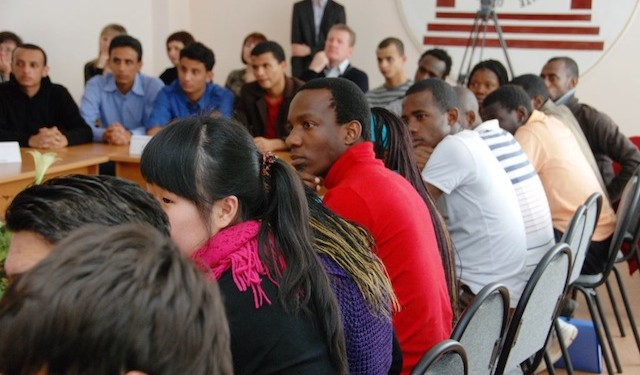Russia has announced it will double the number of scholarships for foreign students at its universities from 10,000 to 20,000 in a further bid to increase overseas interest in its education system. However, the president of Russia’s Association of Foreign Students, Gabriel Kotchofa, has told The PIE News that the country will never fulfil its potential as a study destination unless it overcomes significant barriers.
News and business analysis for Professionals in International Education
Have some pie!
How is Russia’s international education sector developing?
 Orenburg State Institute of Management, Russia, says its region is one Russia's most tolerant and that overseas enrolments climb every year
Orenburg State Institute of Management, Russia, says its region is one Russia's most tolerant and that overseas enrolments climb every year “Russia is losing for two reasons,” he said. “There is no information on studying in Russia for people in Africa and elsewhere. But also because the law is not helping foreigners to come – you can’t work and there are other hurdles.”
Russia had seen an increase of international students at its universities from 41,210 in 2000 to 123,500 in 2010/2011 thanks in part to state-funded scholarships, which cover the entirety of students’ tuition fees, and improved compatibility of the education system.
“To stay you need to get married or get a very big opportunity with a big company”
However, Kotchofa (who became the country’s first ever African professor in 1996) said that the country’s poor work rights for students were a deterrent. Currently, overseas students may not work during their studies and must leave the country a month after their degrees end.
“5-10% stay in Russia after their studies but the proportion who would like to stay is more like 20-30%,” he said. “But the law doesn’t allow it. To stay you need to get married or get a very big opportunity with a big company. Staying is so difficult for foreigners.”
Making this worse are the cost of living in Russia and a lack of positive marketing abroad. Instead, an issue such as racism against non-EU students tends to get more airplay, as seen by numerous exposes in foreign media. Daniel Demelle, a student from Germany who studied political science at Ural Federal University in Ekaterinburg, told The PIE News he enjoyed his six-month exchange but noticed non-EU students being poorly treated.
“A friend of mine from Tajikistan found it quite hard to be accepted”
“As a European student it was really easy to meet people. But a friend of mine from Tajikistan found it quite hard to be accepted,” he said.
“The teacher made a huge difference in the treatment of me and him. He treated my friend quite disrespectfully… You would see this quite often.”
Others say the problem is on the mend. Orenburg State Institute of Management – where African students were asked to leave their halls of residence this April after local government officials wrongly said they were a threat to neighbouring children (although the issue was quickly resolved by the university) – said tolerance was actually at an all time high in the region; a trend reflected across Russia.
Head of international projects and programmes, Daniil Aboimov, said: “During the last years Russia has developed its academic exchanges and the government is promoting tolerance within Russian schools and universities. The situation is improving year to year.”
“There is no government-led strategy on international education. Each university is working alone”
Kotchofa seconded this, saying racism was not the problem it once was. He also reiterated the benefits of studying in Russia – namely quality higher education at affordable prices. Respected medicine courses cost as little as US$5,000 a year compared with around $15,000 in the US. Standards are also climbing with the president, Vladimir Putin, vowing to put five Russian universities into the THE top 100 by 2020, although currently there are none.
“For African and Asian people Russian education is attractive for three reasons,” Kotchofa said. “Quality, cost and recognition of your degree abroad.
“But there is no government-led strategy on international education. Each university is working alone to get foreign students. The government has to put more effort in and money or nothing will be achieved,” he said.
Still looking? Find by category:



One Response to How is Russia’s international education sector developing?